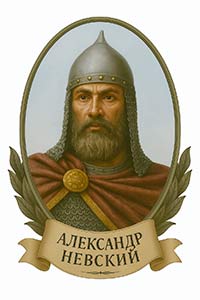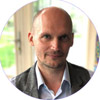История России. Рюрики. 27 АЛЕКСАНДР НЕВСКИЙ
- Подробности
- 1455
На этой странице вы ознакомитесь с основными фактами об АЛЕКСАНДРЕ НЕВСКОМ. Текст озвучен. Даны ключевые слова для запоминания. После изучения текста вы можете проверить себя, чтобы убедиться в понимании материала.

| № | Английский | Русский |
|---|---|---|
| 1 | Alexander Yaroslavich, nicknamed “Nevsky,” was born in 1221 in Pereslavl-Zalessky, lived 42 years (1252 – 1263 11 years) – great-grandson of Vladimir Monomakh, Grand Duke of Vladimir, Kiev and Novgorod, son of Yaroslav Vsevolodovich. | Александр Ярославич по прозвищу «Невский» родился в 1221 г. в Переславле-Залесском, прожил 42 года (1252 – 1263 11 лет) – правнук Владимира Мономаха, великий князь Владимирский, Киевский и Новгородский, сын Ярослава Всеволодовича. |
| 2 | Great commander, saint of the Russian Orthodox Church, one of the famous figures of the ancient Russian state. | Великий полководец, святой Русской православной церкви, один из знаменитых деятелей древнерусского государства. |
| 3 | Alexander's mother, Princess Theodosia – given by God, who was called the holy princess for her piety and meekness. | Мать Александра, княгиня Феодосия – богом данная, которую за её благочестие и кротость называли святой княгиней. |
| 4 | She was the daughter of the great commander and fearless warrior Mstislav the Udal. | Она была дочерью великого полководца и бесстрашного воина Мстислава Удалого. |
| 5 | Already at the age of 5, Alexander took a military oath, and the Suzdal Bishop Simon in the Transfiguration Cathedral of Pereslavl-Zalessky blessed the young prince for military and spiritual feats. | Уже в 5-ти летнем возрасте Александр дал воинскую клятву, и суздальский епископ Симон в Спасо-Преображенском соборе Переславля-Залесского благословил юного князя на ратные и духовные подвиги. |
| 6 | When Alexander and his brother Fyodor reigned in Novgorod and there was a crop failure, the young princes opened their granary and distributed free bread to all those in need. | Когда Александр и его брат Федор княжили в Новгороде и случился неурожай, малолетние князья открыли свою житницу и раздали хлеб всем нуждающимся. |
| 7 | He responded to the Pope’s demand to accept Catholicism with a categorical refusal, which aroused his anger. | На требование папы римского принять католичество он ответил категорическим отказом, чем вызвал его гнев. |
| 8 | Pope Gregory IX, realizing that Rus' was weakened by the Mongols, declared a new crusade against the Baltic states and Russians who professed the Orthodox faith. | Папа римский Григорий IX, понимая, что Русь ослаблена монголами, объявил новый крестовый поход против Прибалтики и русских, которые исповедовали православную веру. |
| 9 | All these forces had to be repelled by the 20-year-old Novgorod prince Alexander. | Всем этим силам должен был дать отпор 20-ти летний новгородский князь Александр. |
| 10 | The son-in-law of the Swedish king, Birger, appeared at the mouth of the Neva River on his ships and conveyed to Alexander: “If you can, defend yourself, for I am already here and will ruin your land.” | Зять шведского короля Биргер появился в устье реки Невы на своих кораблях и передал Александру: «Если можешь, защищайся, ибо я уже здесь и разорю твою землю». |
| 11 | Prince Alexander Yaroslavich prayed in the Church of St. Sophia, received the blessing of the archbishop and addressed his squad: | Князь Александр Ярославич помолился в церкви Святой Софии, получил благословение архиепископа и обратился к своей дружине: |
| 12 | “We are few, but the enemy is strong; but God is not in power, but in truth: follow your prince!” Alexander defeated the Swedes in the battle on the Neva River in 1240. | «Нас немного, а враг силен; но Бог не в силе, а в правде: идите за вашим князем!» Александр разбил шведов в битве на р. Неве в 1240 г. |
| 13 | Despite the crushing defeat on the Neva, the crusade against Rus' continued. | Несмотря на сокрушительное поражение на Неве, крестовый поход на Русь продолжился. |
| 14 | German knights captured Izborsk, besieged Pskov and threatened Novgorod. | Немецкие рыцари захватили Изборск, осадили Псков и угрожали Новгороду. |
| 15 | Alexander Nevsky also defeated the Germans on Lake Peipus. | Александр Невский также разгромил немцев и на Чудском озере. |
| 16 | The battle was called the Battle of the Ice because it took place on the ice of Lake Peipus. | Сражение было названо Ледовым побоищем, так как происходило на льду Чудского озера. |
| 17 | The defeated knights of the German and Livonian orders were driven onto thin ice and fell under it. | Разбитые рыцари немецкого, ливонского ордена были загнаны на тонкий лед и провалились под него. |
| 18 | This happened in 1242, 2 years after the defeat of the Swedes on the Neva. | Это произошло в 1242 г., через 2 года после разгрома шведов на Неве. |
| 19 | The onslaught of the Swedes and Germans was repulsed, but Rus' was still under the Mongol yoke. | Натиск шведов и немцев был отражен, но Русь все еще находилась под монгольским игом. |
| 20 | The forces were unequal to fight the Horde and Alexander had to regularly travel to the Golden Horde to negotiate and save Rus' from new Mongol invasions. | Силы были неравными, чтобы сразиться с ордынцами, и Александр должен был регулярно ездить в Золотую Орду договариваться и спасать Русь от новых нашествий монголов. |
| 21 | He agreed that the Russian princes would not provide their troops for Mongol campaigns and that instead of the Baskaks – representatives of the khan, the Russian princes themselves would collect tribute. | Он договорился, что русские князья не будут предоставлять свои отряды для монгольских походов и что вместо баскаков – представителей хана дань будут собирать сами русские князья. |
| 22 | Under Alexander Yaroslavich, Vladimir, and not Kyiv, began to be considered the capital of Rus'. | При Александре Ярославиче столицей Руси стал считаться Владимир, а не Киев. |
| 23 | He subjugated Novgorod to his power. | Он подчинил своей власти Новгород. |
| 24 | Before his death, Alexander took monastic vows with the name Alexei. | Перед смертью Александр принял монашеский подстриг с именем Алексей. |
| 25 | He died from an infectious disease in 1263 in Gorodets on the way from the Horde. | Умер от инфекционного заболевания в 1263 г. в Городце на пути из Орды. |
| 26 | Alexander Nevsky was buried in Vladimir, in the monastery Church of the Nativity of the Blessed Virgin Mary. | Александр Невский был похоронен во Владимире, в монастырском храме Рождества Пресвятой Богородицы. |
ПРОСЛУШАЙТЕ ТЕКСТ
КЛЮЧЕВЫЕ СЛОВА:
ПРОВЕРЬ СЕБЯ:
1. When and where was Alexander Nevsky born?
2. How long did Alexander Nevsky live?
3. Who was his father?
4. Who was Alexander’s mother?
5. At what age did Alexander take a military oath?
6. What did Alexander and Fyodor do during the crop failure in Novgorod?
7. How did Alexander respond to the Pope's demand to accept Catholicism?
8. Who declared a crusade against Rus’?
9. Who appeared at the mouth of the Neva with ships in 1240?
10. What famous phrase did Alexander say before the Battle of Neva?
11. Who did Alexander defeat on Lake Peipus?
12. What is the battle on Lake Peipus called?
13. What happened to the German knights on the thin ice?
14. In which year did the Battle of the Ice occur?
15. What city began to be considered the capital of Rus’ under Alexander?
16. What agreement did Alexander make with the Mongols?
17. What name did Alexander take before his death?
18. Where and when did Alexander Nevsky die?
ПРОСЛУШАЙТЕ ТЕКСТ




 Как правильно изучать английский язык по карточкам (статьи)
Как правильно изучать английский язык по карточкам (статьи)